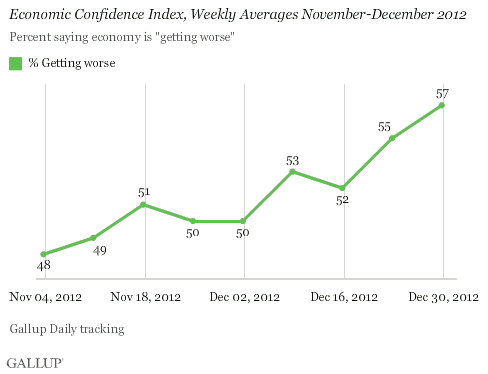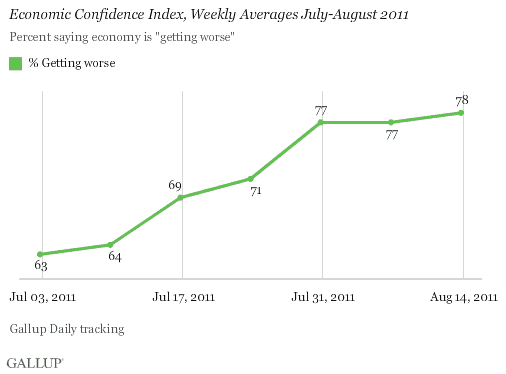As the U.S. fiscal cliff morphs into a new federal debt ceiling confrontation over the first couple of months in 2013, it is essential that corporate management focuses on the behavioral economic impact -- not political score keeping. Last summer, Gallup correctly anticipated the potential for the fiscal cliff to disrupt the economy and compared the fiscal cliff politically to the debt ceiling battle that took place during the summer of 2011. Despite the potential for an immediate-term "rally effect" in the week following passage of the fiscal cliff "fix," Gallup's economic confidence data suggest slower growth and an increased likelihood of recession in 2013.
The percentage of Americans saying the economy is "getting worse" reached 57% in the week ending Dec. 30, up from 48% in the week ending Nov. 4, and 52% as recently as mid-December. It appears that, as the intensity of political confrontation over taxing and spending issues increased in the nation's capital, Americans' economic confidence deteriorated significantly.

In addition to the overall negative psychological impact of the fiscal cliff on Americans' economic confidence, there are also "fiscal drag" issues -- left unaddressed or partially addressed by the fiscal "fix" -- that are likely to slow the U.S. economy in the near term. Although politics make it hard to discern, the idea behind the fiscal cliff was that the expiration of numerous tax provisions and expected implementation of significant spending cuts at the start of 2013 would combine to create an enormous drag on the U.S. economy -- a fiscal drag. New fiscal cliff legislation has limited the size of the tax increases and delayed most spending cuts, thus reducing their negative impact on the economy. But, significant potential for fiscal drag remains as provisions -- such as the payroll tax reduction -- were not extended.
Looking ahead, there is the potential for a further significant deterioration in economic confidence. Although the president has made his objections clear, there seems to be little doubt that the fiscal cliff is in the process of morphing into another federal debt ceiling confrontation. Republicans appear ready to use the debt ceiling as a way to achieve the spending cuts they were not able to address in the new fiscal cliff legislation. At the same time, the president seems likely to seek additional tax revenues since he did not get as much new revenue as he wanted in that same legislation.
In this regard, Gallup's economic confidence data imply that another debt ceiling confrontation is likely to have a significantly negative impact on economic confidence. During the summer of 2011 debt ceiling confrontation, the percentage of Americans saying the economy was "getting worse" hit 77% in the last week of July and the first week of August, up from 63% just before the July 4th holiday week. That is, pessimism reached levels reminiscent of the levels Americans experienced during the recession and financial crisis of 2008-2009.

Fixing the fiscal cliff was supposed to be much more than an exercise in tax policy. Hopes were that the "fix" might address, at least in part, the broader issues of tax reform and entitlements. Even if such a broader effort was not possible, many had hoped the "fix" would not only reduce economic uncertainty, but also avoid creating a significant new "fiscal drag" on an already-weak U.S. economy.
Instead, the new fiscal cliff "fix" legislation seems to have created the potential for a bitter political battle over federal spending and the debt ceiling between now and late February or early March. Ironically, recent history suggests that this kind of intense political confrontation in the months ahead is likely to further increase consumer pessimism and overall economic uncertainty. In turn, this implies slower economic growth, fewer jobs, and a higher probability of recession -- just the opposite of what fixing the fiscal cliff was intended to do.
